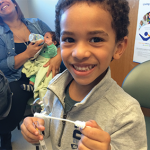ATLANTA—Around 2002, when Vincent Del Gaizo’s son was just 15 months old, he was hospitalized in an intensive care unit and, weeks later, was diagnosed with systemic juvenile idiopathic arthritis (JIA).
“We had the same 8 trillion questions that all parents have when their child is diagnosed with a condition you’ve never heard of: ‘Is he going to get better? What do these medications do? How are we going to treat this? What is his prognosis?’ All of the answers to our questions were, ‘We’re not sure. I don’t know.’” said Mr. Del Gaizo, who was then the owner of a dry cleaning business in New Jersey. “I felt we were just starting on a long journey to get to where we needed to be, to have knowledge to help us make the right decisions.”
Mr. Del Gaizo’s son was diagnosed with JIA by Yukiko Kimura, MD, a pediatric rheumatologist at Hackensack University Medical Center in New Jersey, who told him that “as researchers and clinicians, we have the same questions you do. We don’t know the answers, and the best ways to find them is to do it collaboratively.” She told him about a new organization, the Childhood Arthritis and Rheumatology Research Alliance (CARRA), which was formed to facilitate investigator-led pediatric rheumatology research studies to gather evidence and create a patient registry that would guide treatment decisions for pediatric patients.
The organization now includes families and patients in research as full partners, said Mr. Del Gaizo, who eventually left his business to work full-time for CARRA as director of strategic partnerships and patient engagement. He and Esi M. Morgan, MD, MSCE, a pediatric rheumatologist and researcher at Cincinnati Children’s Hospital, shared some of the barriers clinicians must overcome when recruiting families of children with juvenile rheumatic diseases into research studies at a session on Nov. 12 at the 2019 ACR/ARP Annual Meeting.
Full, Not Token, Research Partners

Mr. Del Gaizo
Pediatric rheumatologists need more involvement from patients and their families to increase the relevance and feasibility of their research studies, Mr. Del Gaizo said. Many barriers to enrolling pediatric patients in clinical trials—or any medical research—exist: According to a 2018 survey of 136 providers of pediatric healthcare conducted by the American Academy of Pediatrics, these barriers include lack of awareness, trial risks, and time and travel distance to participate in trials. The survey also found that parental concerns were greater obstacles to participation than ethical or regulatory barriers.1
Mr. Del Gaizo noticed many of these barriers as he became involved in pediatric rheumatology research more than 15 years ago. Through such organizations as CARRA, the Patient-Centered Outcomes Research Institute (PCORI), the Pediatric Rheumatology Care and Outcomes Improvement Network (PR-COIN) and the Partners Patient-Powered Research Network (PPRN), more parents and children are being recruited to partner in research studies, including the Start Time Optimization of Biologic Therapy in Polyarticular JIA (STOP-JIA) trial, which has enrolled 401 patients at 53 sites in the U.S. and Canada, he said. The trial examines when to start JIA patients on biologic therapy.2 Parents and patients are part of the study team, selected the trial’s patient-reported outcomes measures and created the recruitment tools.
In Limit-JIA, a current PCORI-funded trial of abatacept in children with JIA limited to four joints or fewer to determine if the drug can prevent uveitis and/or disease extension to more than four joints, three parents are part of the study team. They helped develop and conduct focus groups with other families to assess the relevance of the study’s aims and outcomes, and assisted researchers with protocol development.
How can researchers engage more families in pediatric rheumatology studies? Mr. Del Gaizo suggested these steps:


